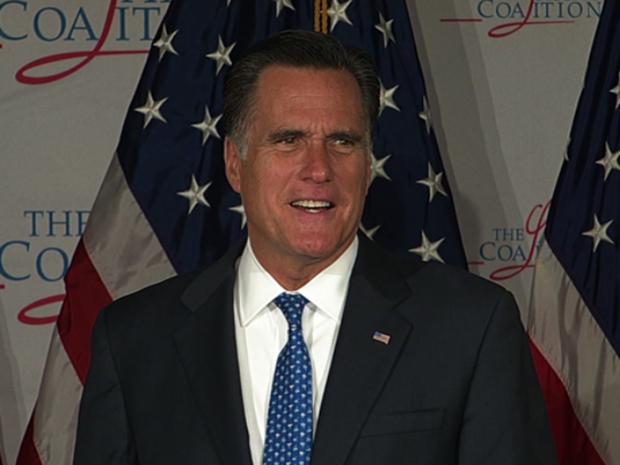Romney would greatly expand school choice
Updated 4:30 p.m. ET
(CBS News) Republican presidential candidate Mitt Romney on Wednesday proposed a major change in the government's education policy that would tie federal funds to students and not to schools for the first time and greatly expand school choice.
"I'm going to expand parental choice in an unprecedented way," Romney said to applause at the Latino Coalition's Annual Economic Summit in Washington. "Too many of our kids are trapped in schools that are failing or simply don't meet their needs. And for too long, we've merely talked about the virtues of school choice without really doing something about it."
He said that he would allow parents of low-income and special needs students to choose where their children go to school - a public school outside the geographically assigned area where they live, a charter school or a private or parochial school.
In delivering his remarks, Romney dropped a reference to private schools being covered by his school choice policy, which had been included in speech excerpts distributed by the campaign moments before he started speaking. But his campaign aides told reporters after the speech that he inadvertently left out the private school reference, and that private and parochial schools would be included in the school choice policy.
The money provided by the federal government would only subsidize the school choice however, with only Title 1 or IDEA funds, dollars for low-income students and special education, traveling with the student, unless a state decided pitch in more.
Also, in a conference call with reporters earlier Wednesday, Romney campaign staff said the policy would cover private and parochial schools.
Romney also called for restoring funding for the D.C. Opportunity Scholarship Program, a program created under President George W. Bush that provides scholarships to low-income children in Washington D.C. that can be used at private schools. The program was curtailed under the Obama administration, but Romney said the renewed program would be "a model for parental choice for school systems across the nation. "
Other major proposals in his speech included: A requirement that states provide a simple-to-read and widely available public report card evaluating every school and a proposal to streamline teacher evaluations by consolidating 82 current federal programs in 10 agencies that focus on teacher quality and replacing them with block grants to the states.
Romney also sharply attacked teachers' unions as the biggest impediment to improving the quality of teachers in classrooms. While making a point of praising effective teachers, Romney called the unions most of them belong to "the clearest example of a group that has lost its way."
"The teachers unions don't fight for our children," he said. "That's our job. And our job keeps getting harder because the unions wield outsized influence in elections and campaigns."
Romney argued that President Obama was hamstrung when it came to the issue of education reform because 90 percent of the money given to political campaigns by teachers unions went to Democrats in 2008."Most likely, he would have liked to do more," Romney said of Obama. "But the teachers unions are one of the Democrats' biggest donors, and one of the President's biggest campaign supporters. So, President Obama has been unable to stand up to union bosses, and unwilling to stand up for our kids."
Romney told the audience that as governor of Massachusetts, he took a stand against pressure from teachers' unions by getting through the Legislature a bill to require students to pass a test to graduate from high school. The measure was opposed by the unions, he said.
"States are going to be rewarded if they regularly evaluate teachers for their effectiveness and if they compensate the best teachers for teaching success in the classroom," Romney said. "Teaching is a highly valued profession. It's got to attract the best and brightest from around the country."
One of the major teacher's unions, the National Education Association (NEA), responded to Romney's remarks.
"We simply can't afford to put in Romney's hands the future of our students and our country," NEA president Dennis Van Roekel said in a statement. "Attacking educators and unions like the NEA with gross exaggerations about its political muscle and with divide and conquer tactics is a distraction from having to confront the real questions about his education record as governor of Massachusetts and his full embrace of the Ryan-Romney dream-killing budget."
Although Romney painted a grim portrait of the state of education in the country, saying that "millions of kids are getting a Third World education," he insisted that the United States can correct the problems if his conservative ideas are implemented.
"We already have good teachers, and engaged parents, and big ideas," he said. "What we need now is strong political leadership and political will."
The speech marked the presumptive Republican nominee's first major address on education.
